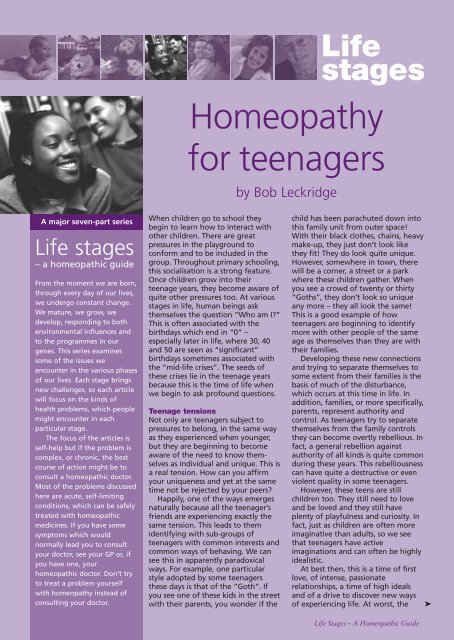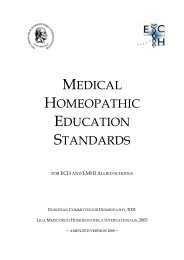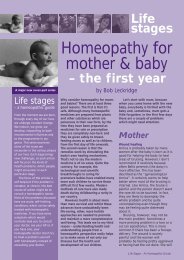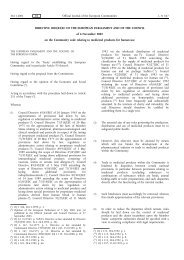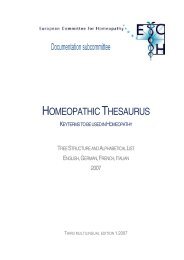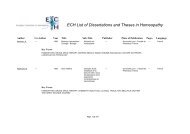Homeopathy for teenagers
Homeopathy for teenagers
Homeopathy for teenagers
- No tags were found...
You also want an ePaper? Increase the reach of your titles
YUMPU automatically turns print PDFs into web optimized ePapers that Google loves.
<strong>Homeopathy</strong><strong>for</strong> <strong>teenagers</strong>by Bob LeckridgeLifestagesA major seven-part seriesLife stages– a homeopathic guideFrom the moment we are born,through every day of our lives,we undergo constant change.We mature, we grow, wedevelop, responding to bothenvironmental influences andto the programmes in ourgenes. This series examinessome of the issues weencounter in the various phasesof our lives. Each stage bringsnew challenges, so each articlewill focus on the kinds ofhealth problems, which peoplemight encounter in eachparticular stage.The focus of the articles isself-help but if the problem iscomplex, or chronic, the bestcourse of action might be toconsult a homeopathic doctor.Most of the problems discussedhere are acute, self-limitingconditions, which can be safelytreated with homeopathicmedicines. If you have somesymptoms which wouldnormally lead you to consultyour doctor, see your GP or, ifyou have one, yourhomeopathic doctor. Don’t tryto treat a problem yourselfwith homeopathy instead ofconsulting your doctor.When children go to school theybegin to learn how to interact withother children. There are greatpressures in the playground tocon<strong>for</strong>m and to be included in thegroup. Throughout primary schooling,this socialisation is a strong feature.Once children grow into theirteenage years, they become aware ofquite other pressures too. At variousstages in life, human beings askthemselves the question “Who am I?”This is often associated with thebirthdays which end in “0” –especially later in life, where 30, 40and 50 are seen as “significant”birthdays sometimes associated withthe “mid-life crises”. The seeds ofthese crises lie in the teenage yearsbecause this is the time of life whenwe begin to ask profound questions.Teenage tensionsNot only are <strong>teenagers</strong> subject topressures to belong, in the same wayas they experienced when younger,but they are beginning to becomeaware of the need to know themselvesas individual and unique. This isa real tension. How can you affirmyour uniqueness and yet at the sametime not be rejected by your peers?Happily, one of the ways emergesnaturally because all the teenager’sfriends are experiencing exactly thesame tension. This leads to themidentifying with sub-groups of<strong>teenagers</strong> with common interests andcommon ways of behaving. We cansee this in apparently paradoxicalways. For example, one particularstyle adopted by some <strong>teenagers</strong>these days is that of the “Goth”. Ifyou see one of these kids in the streetwith their parents, you wonder if thechild has been parachuted down intothis family unit from outer space!With their black clothes, chains, heavymake-up, they just don’t look likethey fit! They do look quite unique.However, somewhere in town, therewill be a corner, a street or a parkwhere these children gather. Whenyou see a crowd of twenty or thirty“Goths”, they don’t look so uniqueany more – they all look the same!This is a good example of how<strong>teenagers</strong> are beginning to identifymore with other people of the sameage as themselves than they are withtheir families.Developing these new connectionsand trying to separate themselves tosome extent from their families is thebasis of much of the disturbance,which occurs at this time in life. Inaddition, families, or more specifically,parents, represent authority andcontrol. As <strong>teenagers</strong> try to separatethemselves from the family controlsthey can become overtly rebellious. Infact, a general rebellion againstauthority of all kinds is quite commonduring these years. This rebelliousnesscan have quite a destructive or evenviolent quality in some <strong>teenagers</strong>.However, these teens are stillchildren too. They still need to loveand be loved and they still haveplenty of playfulness and curiosity. Infact, just as children are often moreimaginative than adults, so we seethat <strong>teenagers</strong> have activeimaginations and can often be highlyidealistic.At best then, this is a time of firstlove, of intense, passionaterelationships, a time of high idealsand of a drive to discover new waysof experiencing life. At worst, the ➤Life Stages – A Homeopathic Guide
LifestagesMike Brownetensions produce self-doubt, fed bybroken relationships, lost loves anddisappointments, which lead tomelancholy and even depressive orself-destructive experiences.Hormonal changesThese issues are not, however, theonly ones facing <strong>teenagers</strong>. Wechange all the time. Our bodies arealways changing. We see this mostobviously in the first couple ofdecades of life where little childrenquickly grow taller. Not only aretheir bodies growing and maturinghowever, so are their personalities.We watch our children developnew skills week by weekthroughout the first years of life,and this development continuesapace throughout the teens.However, there is the addition of acrucially important element at thistime – the sex hormones. Pubertybrings about enormous changes inthe shape of these children’sbodies. Boys’ voices “break” andthey begin to develop body andfacial hair. Girls begin tomenstruate and to develop breastsand body hair. In addition thesurging hormones impact on theskin and many <strong>teenagers</strong>experience the sufferings of theplague of acne.Amongst the common healthproblems in these years, there<strong>for</strong>e,are skin complaints, menstrualLife Stages – A Homeopathic Guidedifficulties and emotional/behavioural problems.Homeopathic interventionIn the conditions, which arestrongly physical, like acne andmenstrual problems, homeopathicmedicines can help stimulate thehealing system to deal with thehormonal changes naturally and soreduce the harmful impacts on thebody that produce these problems.In addition, however, reading thenarratives of some “constitutional”homeopathic medicines which arecommonly indicated at this timewill not only help the teenagerholistically but will help his or herparents to understand them better.A “constitutional” medicine is one,which closely matches a wide rangeof features in the patient’sexperience. Not just particularsymptoms, which are beingexperienced but sensitivities andways of coping also. Here are someof the more common ones. Maybeyou will recognise a teenager youknow in one of these descriptions.HelleborusThese are children who are oftendescribed as “unusuallycompassionate”. This can makethem stand out from others andeven seem a bit eccentric. Theyhave their own ways of doingthings, but because of their caringattitude this difference is notgenerally perceived by others as abad thing. If these children arestruck with self-doubt then thingsbegin to change dramatically. Theystart to close down and withdraw.What kinds of events mightproduce this change? The grief ofthe loss of a loved one – notnecessarily a death in the family,but the loss of the first love.Moving house, particularly toanother area altogether wherethey have to make newconnections and new friends. Atthis time they can becomesignificantly homesick. Or it mightbe a physical event, like a headinjury. This closing down state istypified by moroseness, grumpinessand ill-temper.They lose all their motivationand say that nothing interests themany more. Expressions of sympathyand attention just seem to makethem worse by making them moreaware of their distress. This state isaccompanied by a slowing up, seennot only in apathy, but in a slowingof their speech. They are reluctantto talk, speak slowly, if at all, andeven seem to think slowly.Throughout this they maintain thatstrong sense of individuality andexpress that through dress. Oftenwhat they wear, others findstrange, or “inappropriate”. Theycan become quite obsessed withdeath and dying and withdrawinto their own imaginary worlds.CinaCina children are bright,imaginative and fun when well,but we rarely see them in thisstate. When they become unwellthey develop a real dissatisfactionwith everything, which is expressedthrough what are typicallydescribed as “ugly” moods. Whenupset, rather than withdrawing likethe Helleborus children, thesechildren make a noise about it.They complain and they complainloudly. They are in a veryuncom<strong>for</strong>table state where theydon’t want to be ignored but theydon’t want attention either – really,
4: <strong>Homeopathy</strong> <strong>for</strong> <strong>teenagers</strong>there is no pleasing them!These are children who candevelop tics and spasms, or evenepileptic type “absences”. They,too, have active imaginations andcan become quite disturbed,especially at night, when they areactive dreamers and will talk oreven scream in their sleep.TuberculinumIn previous articles we have seenthat Tuberculinum can be acommon remedy in young childrenand even toddlers and here in theteenage years it is also common.The typical teenager who needsthis remedy is restless, stubbornand very rebellious. They can bequite malicious, or even destructivewhen they are angry. They arecontinuously kicking against anyidea of authority and yet are highlyidealistic, even romantic, in theirthinking.These are the kids who identifywith political revolutionaries, andwho, in times past, would put upposters of Che Guevara andChairman Mao on their bedroomwalls – not so common these days!They might identify with other“rebels”. The punk rock movementattracted a lot of these kids(although it also attracted manyother <strong>teenagers</strong> who needed quitedifferent homeopathic medicines!).Despite their anger and theirrestlessness, they still have manyfears and these might be quitespecific – dogs, thunderstorms,darkness, <strong>for</strong> example.Skin problemsAcne is common to both boys andgirls but is more common in theboys. This is because it isparticularly provoked by thecirculating testosterone levels,which make the skin more greasyand oily. The pores become blockedand infected and so we see the fullrange of spots, from black-heads,to red swellings, to pus-fillederuptions ,which cause <strong>teenagers</strong>such distress. In more severe cases,there can be many spots over theface, the <strong>for</strong>ehead, the chest andthe back, and the most severe onesare quite destructive of the skinleaving deep pits and scars. Whilsteven in its milder <strong>for</strong>ms acne cancause great distress, in its mostsevere <strong>for</strong>ms it leaves permanentscarring.The orthodox treatments <strong>for</strong> acnecentre around the use of antibiotics,used either in short courses to fightthe larger, more painful lesions, orin low doses over longer periods oftime to treat chronic acne. Thehomeopathic approach is to tryand stimulate the person’s ownhealing system to reduce thesensitivity in the skin to thecirculating hormones. One goodway to do this is to give them their“constitutional” medicine but thisis very difficult to work out if youare the parent. It is best to have afull consultation with a homeopathicdoctor if you want to takethis approach. However, there aresome common medicines, which maybe indicated on the basis of someof the features of the acne itself.For treatment of the biggerspots, which might even be smallabscesses, Hepar sulph can beindicated. This is where a lot of pushas gathered, the patient feelschilly and irritable, and there isconsiderable swelling andtenderness. They might find thatputting a hot cloth against the sorebit helps. At an earlier stage to this,where there is just redness, heatand swelling but no pus yet, thenBelladonna might be more useful,especially if the patient is agitated,restless and fevered.When we considered theproblems of children in an earlierarticle, we looked at Sulphur as acommon medicine <strong>for</strong> the restless,inquisitive, messy and disorganisedchild. Certainly, many <strong>teenagers</strong>’rooms look like “Sulphur rooms”!They are messy and chaotic and asthey develop many passing fancieswith a disposition to collect things,their rooms are really full of“stuff”! These tend to be hot,sweaty <strong>teenagers</strong> who love nothingbetter than fast food, like burgers,pizzas and chips. They often havequite bad skin with many red, itchyand hot patches and spots.Silica is a common remedy inacne. The Silica child tends to be abit chilly, sensitive, shy and veryconcerned to do well at school.Indeed, a fear of failing can causemany problems <strong>for</strong> these patientsaround examination times. Theirskin is unhealthy and injuries,scratches and inflammation easilybecome infected with theinfections grumbling on <strong>for</strong> longperiods of time. These skinproblems are not as dramatic as inthe Hepar sulph or the Sulphurstates but seem to be more chronic.These are also sweaty kids withparticularly offensive foot sweats.Kali bromatum is anothercommon acne medicine. This ismore commonly indicated in some ➤Life Stages – A Homeopathic Guide
Lifestagesof the more severe cases of acne,especially with lots of itchy lesions,which are worse be<strong>for</strong>e eachperiod. These children are oftenlow in energy, sleepy and worriedabout not getting on well atschool. They are afraid they are notas clever as their friends.Period painsIn the early years of a girl’s periods,there are commonly problems withpainful periods and with veryirregular periods. In most cases,both of these problems settledown in time and the body adjustsnaturally. However, in many girlsthe problem is severe enough tocause them to lose time off schooland to generally make their livesmiserable. Almost the onlytreatments on offer from thedoctor are painkillers and,sometimes, the oral contraceptivepill. Both of these approaches usedrugs on a frequent, or even semipermanentbasis, and most peoplewould really rather try to find amore natural solution. Herehomeopathy has a role to play, intrying to stimulate the naturalregulatory systems and resolve theproblems without drugs.One of the most commonlyindicated homeopathic medicines<strong>for</strong> period pain (dysmenorrhoea) isMagnesium phosphoricum (Magphos). This is indicated when thereis severe colicky abdominal painwhich <strong>for</strong>ces the girl to bend overor curl up so she can press on thesore part and where the pains arerelieved by holding a hot waterbottle against the affected area.This is quite common in girls whoare sensitive, in fact, maybe evenoversensitive to things. They areeasily disturbed by scary or violentthings on TV and are oversensitiveto pain.Another medicine <strong>for</strong>dysmenorrhoea is Chamomilla. Thisis indicated when the girl becomeextremely irritable with the pain,crying out and shouting out anddemanding attention. It is acommon remedy <strong>for</strong> the teethinginfant, but is often <strong>for</strong>gotten as amedicine <strong>for</strong> these girls with theirdysmenorrhoea.Lachesis is often indicated <strong>for</strong>period pains which are worse inthe run up to the period eachmonth but which go away veryquickly whenever the bleedingbegins. It is indicated in girls whohave fiery tempers and who reactincreasingly aggressively as theperiod approaches. They are alsolikely to complain of feelingbloated and have swollen painfulbreasts in the premenstrual days.Everything instantly gets betterwhen the period begins.Pulsatilla is a good medicine <strong>for</strong>girls whose periods tend to be veryerratic, sometimes coming tooearly, sometimes too late. Thepattern is constantly changing. Thisis really a key feature of Pulsatilla –the variability of the symptoms.They become very weepy andemotional be<strong>for</strong>e their periods andneed to have company andsympathy to feel well. These girlsare typically quite shy, althoughthey are very sociable and respondwell to the attentions of theirfriends and family.Another homeopathic medicine,which can be useful at this time ina girl’s life is China. This is a goodremedy <strong>for</strong> girl’s who get reallyexhausted after a heavy period.Their periods tend to be heavierthan average and are really quitedebilitating so that they often losetime off school because they arejust so exhausted. In this state theyfeel very physically weak and canbe quite tremulous. This is anoversensitive state, and they areoversensitive to lights, to noise andeven to smells.There are, of course, many otherproblems, which can beexperienced by <strong>teenagers</strong>, butthese descriptions of teenagebehavioural changes and somemedicines <strong>for</strong> acne and periodproblems are all very commonpatterns and I expect you willrecognise at least one of them in ateenager you know.These can be very difficult andchallenging years, but yourteenager needs two things fromyou more than anything else: toknow that you still love them (nomatter what!) and to feel secure –home can be a safe haven in thesetroubled times. You might beamazed how your children changewhen they enter their teens, butthe vast majority emerges at theother end of the teens as balanced,and very likeable young adults!If you are going to use any of the medicines mentioned,unless a specific dose is recommended by your homeopathicdoctor, use a 30c strength and repeat the doses as often asis necessary. The rule in homeopathy is to take a dose,experience the improvement, then if the improvement startsto decline, repeat the remedy. If a dose does not produceany improvement, then there is no point in repeating thatparticular remedy.Bob Leckridge MBChB FFHom graduated from Edinburgh University in 1978 and worked as a GP until 1995since when he has worked full-time as a Specialist in Homeopathic Medicine at Glasgow HomoeopathicHospital. He teaches homeopathy internationally and is the author of <strong>Homeopathy</strong> in Primary Care. Hebecame President of the Faculty of <strong>Homeopathy</strong> in 1998.Life Stages – A Homeopathic Guide


